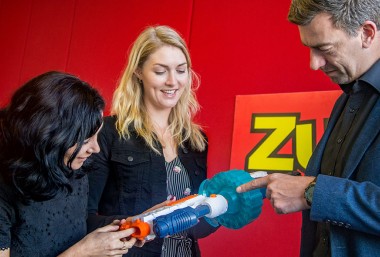Known for its innovation and speed to market, ZURU is the world’s fastest growing toy company. Founders Mat, Anna and Nick Mowbray have taken ZURU from very humble beginnings in a shed on their parents’ Waikato farm to its spot in the top 10 toy companies on the planet.
It all started when a 12-year-old Mat won the national science fair with his model hot air balloon. He and his brother Nick spent their school holidays producing the kitsets and selling them door to door. A few years later, they had a crazy idea to move to China and set up a production line with a $20,000 loan from their parents. There were many false starts along the way, but their eventual decision to adopt simple innovation by giving familiar products a cool edge, coupled with a dogged determination to catch the attention of big retail buyers, saw them gain traction in the competitive toy market.
Fifteen years on, ZURU designs, develops and manufactures its own toys as well as licensing concepts from inventors around the world. The company produces more than 400,000 toys a day and supplies major retailers in 120 countries. With 5,000 staff in 17 international offices and four factories, ZURU’s annual revenue has now topped $600 million.
An idea worth copying
They say imitation is the sincerest form of flattery, and with the spectacular success of some of ZURU’s leading products, Bunch O Balloons, Robofish and Fidget Cube, the copycats have pounced.
Protecting ZURU’s valuable intellectual property (IP) has become increasingly important to the company and its customers, says IP Manager Nikki Kahn. A patent attorney and IP specialist, Kahn left AJ Park to become ZURU’s in-house counsel. Focusing on ZURU’s IP portfolio and enforcement strategies, she still works closely with AJ Park principal Anton Blijlevens, whose relationship with Mat Mowbray began a decade ago when Mowbray approached AJ Park for help protecting his building-products venture.

From left to right: Renee Lee, Global Marketing Director of ZURU, Nikki Kahn, IP Manager & In House Counsel of ZURU, and Anton Blijlevens, Principal of AJ Park
"Now that ZURU is becoming a key player in the toy market, we’re starting to see increased numbers of counterfeits of our toys and need to be even more active in enforcing our IP rights,” says Kahn. “We’ve had to expand our portfolio of registered rights, because in addition to keeping an edge over our long-standing competitors in the retail stores, we also have to keep on top of a multitude of much smaller players trying to sell low-quality copies of our toys online. We know people are going to copy our products; and we get ready to combat the copies wherever they pop up. By strategically selecting and pursuing IP enforcement targets, we can send out a strong message to deter other infringers.
Fighting the imitators
The nature of the toy industry means that ZURU is in constant litigation with competitors and infringers from the US and Australia to Israel and Europe.
ZURU’s founders originally felt that IP protection wasn’t suited to the lifecycle and strategy of their toy business, says Blijlevens. But the success of their products attracted attention and the copycats swooped in. Suddenly, IP rights became extremely relevant.
AJ Park’s role is to help manage ZURU’s extensive IP portfolio, preparing and filing patent and design applications worldwide.
“Others see how well ZURU’s toy sales are going and want to be a ‘me too’ operator,” says Blijlevens. “They can swiftly enter the market, so if we can help get ZURU’s IP rights granted rapidly, the counterfeit-product market can be shut down quite quickly by ZURU.”
Securing patents can sometimes take three to four years—a timeframe that’s incompatible with the typical short lifecycle of toy products. However, there are some strategies for obtaining enforceable IP rights more quickly. For example, the new fast-track patent systems in the US and elsewhere allow patents to be granted within six to 12 months. ZURU adopts a strategy of filing for registered IP rights as soon as a product is in early development and is a certainty to go to market. This means that most products can be launched with registered IP in place as soon as they hit the market.
Staying one step ahead
ZURU operates several layers of enforcement of its IP rights. The company has a fulltime team of three monitoring online platforms to search for copies and have them removed from sale.
“Copies of our products sold online are visible to everyone, including our own customers, so if we don’t control the online platforms it could really damage our brands” explains Kahn.
ZURU also carries out a rigorous border IP enforcement programme, working with Customs authorities in each of its main markets to catch shipments of infringing product as they enter the country. Likewise, ZURU’s worldwide network of authorised distributors proactively report copies to ZURU and assist with enforcement efforts inside of their local markets.
Learnings for Kiwi businesses
What can New Zealand businesses take from the ZURU story? Blijlevens says it’s important to look globally as you never know where your business might end up.
New Zealand entrepreneurs don’t often think beyond the local market where there’s a lot more trust and arguably less need for IP protection. Elsewhere, business is much more competitive and IP rights become vital; you might own the rights yourself or you may end up licensing your invention to someone else. The further you are from your market and the less you know your competition or have your finger on the pulse, the more you need patents and other IP to try to keep your competitors honest.
Anton Blijlevens, AJ Park
The Bunch O Balloons story is valuable for Kiwi inventors, Blijlevens says. The product’s creator, a Texan father of eight, had wisely filed a patent application for his invention. Having seen his Kickstarter advertising campaign, ZURU won a bidding war for the rights to it.
“Some inventors say they can’t afford to file a patent and will never be able to defend it,” says Blijlevens. “But this guy licensed that patent and now the licensee contributes very significantly to the costs of litigation to defend it. Remember that you may want to sell your invention and someone else will be become responsible for its use, so the patent is valuable. ZURU can definitely afford to litigate against infringements of Bunch O Balloons, but if the inventor tried to establish a business making these balloons himself, he might not have scaled up enough or fast enough to have been in that position.”
Preparing for future growth
Over the last four or so years, ZURU has seen accelerated growth. The ZURU Group now includes operations in Europe, Canada and South America, and a showroom in Los Angeles.
“ZURU’s initial IP strategy was very organic with a lot of learning around markets,” says Kahn. “We are now implementing comprehensive IP enforcement strategies to protect newly launched products in around 20 of our key markets, and more systematically incorporating IP protection into our product development process.”
Thanks to its contracts with retail giants such as Walmart, Tesco and Target, ZURU now has established channels to market and has branched out into other FMCG products such as feminine care, nappies and pet food. From a shed in the Waikato, the Mowbrays have come a long way and they don’t look ready to slow down any time soon.
Written by: Deirdre Coleman
Photo credit: Shaun Lee

